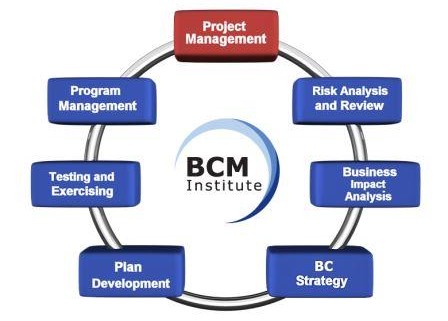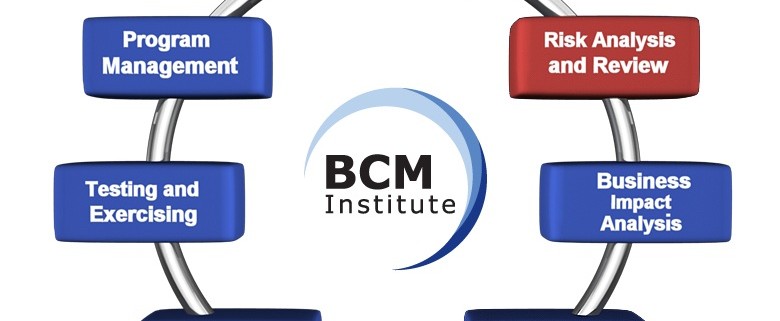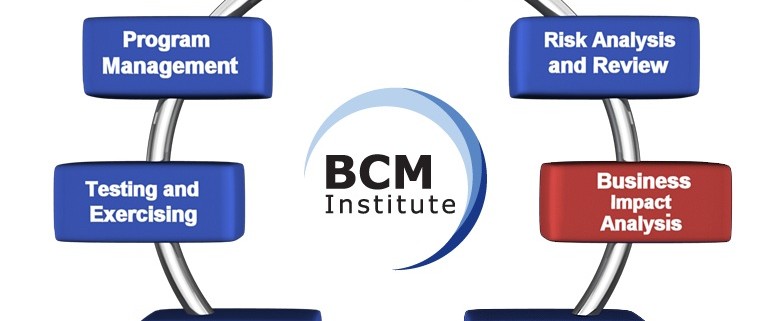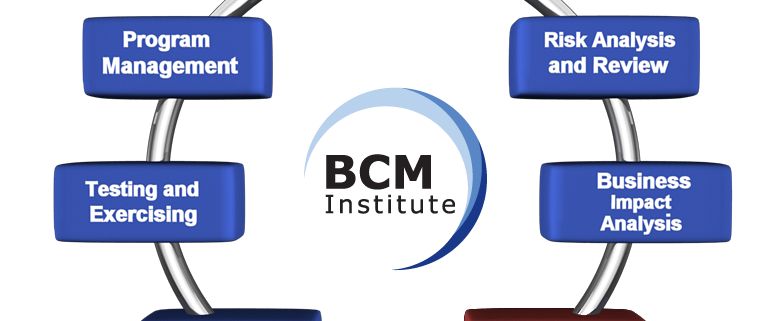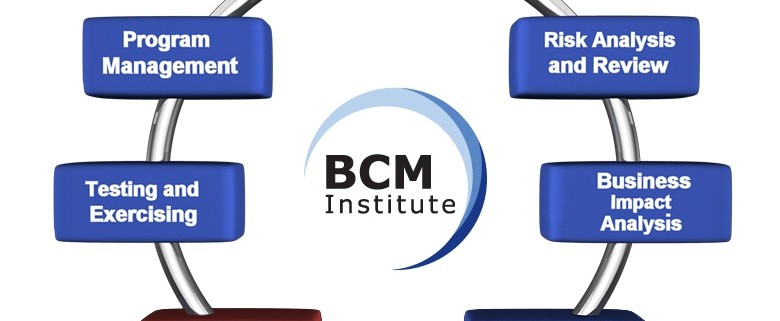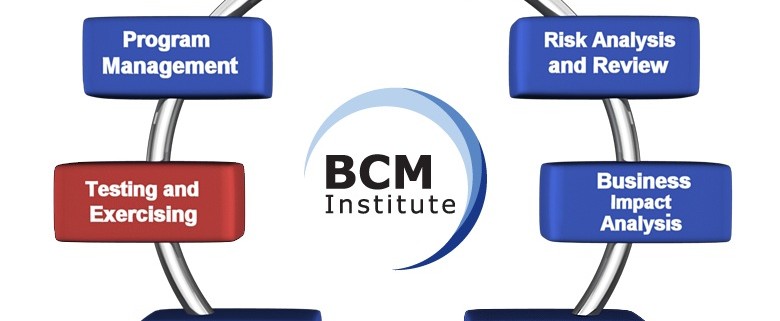Project Management
 Project Management is one of the most important factors that will determine the degree of success of an organization’s BCP implementation. For organizations implementing BCP for the first time, this poses an even greater challenge. Standard project management skills, knowledge and experience of the project team members is a desirable attribute. However, the main challenge is usually the need for a proven and effective BC planning methodology to be adopted. The BCP project can better succeed when all project team members and subject matter experts involved in the project diligently follow this methodology; with a clear understanding of their roles and responsibilities, as well as the tasks and the due dates for them.Therefore, it is essential for the organization to develop a BCP project implementation and charter; which shall consist of the following:
Project Management is one of the most important factors that will determine the degree of success of an organization’s BCP implementation. For organizations implementing BCP for the first time, this poses an even greater challenge. Standard project management skills, knowledge and experience of the project team members is a desirable attribute. However, the main challenge is usually the need for a proven and effective BC planning methodology to be adopted. The BCP project can better succeed when all project team members and subject matter experts involved in the project diligently follow this methodology; with a clear understanding of their roles and responsibilities, as well as the tasks and the due dates for them.Therefore, it is essential for the organization to develop a BCP project implementation and charter; which shall consist of the following:
- Project scope, framework and methodology
- BCM organization with clearly defined team member roles and responsibilities
- Project schedule and milestones
- Objectives, tasks and expected outcomes for each phase
Risk Analysis and Review
 In the Risk Analysis and Review phase, GMH will assist our clients to catalogue and rank potential threats, determine potential risks to business operations; so as to define a set of priorities for the detailed analysis of vulnerabilities, and strengthen existing and implement new control measures. This will encompass the operational capabilities, physical assets, technology infrastructure and IT systems, required to process information and conduct business.
In the Risk Analysis and Review phase, GMH will assist our clients to catalogue and rank potential threats, determine potential risks to business operations; so as to define a set of priorities for the detailed analysis of vulnerabilities, and strengthen existing and implement new control measures. This will encompass the operational capabilities, physical assets, technology infrastructure and IT systems, required to process information and conduct business.
Business Impact Analysis
 In our experience in assisting clients to implement their BC and DR plans, the Business Impact Analysis phase is often the most challenging phase to implement. Here, GMH will assist clients to analyse potential business impact associated with the catalog of threats; so as to define priorities for the recovery and resumption of critical business functions, recovery timeframes, dependencies between business units and dependencies with key external suppliers and agencies, minimum resources required to perform the activities, and vital records needed to support the activities.
In our experience in assisting clients to implement their BC and DR plans, the Business Impact Analysis phase is often the most challenging phase to implement. Here, GMH will assist clients to analyse potential business impact associated with the catalog of threats; so as to define priorities for the recovery and resumption of critical business functions, recovery timeframes, dependencies between business units and dependencies with key external suppliers and agencies, minimum resources required to perform the activities, and vital records needed to support the activities.
Business Continuity Strategy
 Every customer after having identified the key threats, risks, critical business functions, recovery time scales and related objectives, need to implement effective BC strategies to overcome the issues and meet the minimum business continuity objectives established by the business. By leveraging on GMH’s consultants, our customers will:
Every customer after having identified the key threats, risks, critical business functions, recovery time scales and related objectives, need to implement effective BC strategies to overcome the issues and meet the minimum business continuity objectives established by the business. By leveraging on GMH’s consultants, our customers will:
- Identify recovery strategy solutions and requirements.
- Determine business units, corporate-wide, IT, telecommunication recovery strategies
- Develop cost benefit analysis for for selected strategy.
- Develop specifications for alternate sites and offsite storage.
- Assist with the site selection and request for proopsal, if required.
- Identify alternative processing procedure for continuity of critical business functions whilst recovery is in progress.
- Identify and formalize backup for business and IT processes needed to survive a disaster.
- Consolidate strategy and present a list of strategic plans for recovering prioritised business functions to executive management.
Plan Development
GMH consultants will guide you to put together a choreographed sequence of actions that counteracts or mitigate the effects of the threats or risks identified in the Risk Analysis and Review phase, in relation to the critical business function in the Business Impact Analysis (BIA) phase; and Recovery Strategy phase based on the approved set of recovery strategies or options.
consultants will guide you to put together a choreographed sequence of actions that counteracts or mitigate the effects of the threats or risks identified in the Risk Analysis and Review phase, in relation to the critical business function in the Business Impact Analysis (BIA) phase; and Recovery Strategy phase based on the approved set of recovery strategies or options.
- Create a document or set of documents which to catalog the procedures to re-establish critical business functions.
- Provide user-friendly plan templates.
- Ensure that the plan is easy to navigate.
- Ensure the plan is precise and concise; so that it is easily understood by all relevant staff.
- Document recovery team structure, staffing of the recovery teams with includes names of specific staff members.
- Develop and implement processes to integrate incident response and BC plan activation.
- Establish procedures to coordinate with public authorities and external agencies during a disaster.
- Plan and coordinate the management of media during a crisis situation.
- Design and implement the business continuity plan, and other related plans – like the disaster recovery plan, crisis management plan. crisis communications plan and so on.
Testing and Exercising
 GMH’s consultants are often engaged by client organizations to assist with the planning and conduct of tests and exercises; which are designed to increase BCM capabilities and competencies amongst staff and management. The scenarios developed will be consistent with the client’s BC plan and identified potential threats. The simulated scenarios and incidents will be practical and realistic; thus, providing a “real-life” situation that will achieve the client’s exercise/test objectives and requirements. GMH is also commonly engaged by client organizations to develop test and exercise programs that will enable their organizations to progressively enhance the organizational-wide preparedness.
GMH’s consultants are often engaged by client organizations to assist with the planning and conduct of tests and exercises; which are designed to increase BCM capabilities and competencies amongst staff and management. The scenarios developed will be consistent with the client’s BC plan and identified potential threats. The simulated scenarios and incidents will be practical and realistic; thus, providing a “real-life” situation that will achieve the client’s exercise/test objectives and requirements. GMH is also commonly engaged by client organizations to develop test and exercise programs that will enable their organizations to progressively enhance the organizational-wide preparedness.

